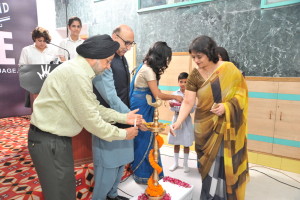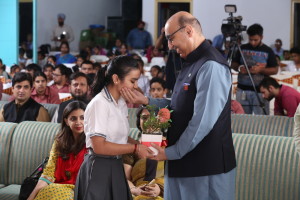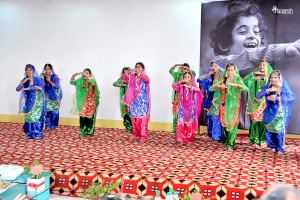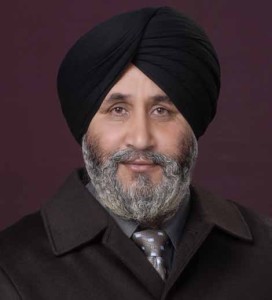Realising the fact that Skill education is the need of the hour, the Government is running several initiatives that empowers the youth of the country to be skilled to earn their livelihood, even after completing the senior secondary level. Elets News Network (ENN) brings together government initiatives in the sector to help the country scale the skill map.
 With 430 million people in the age group of 15- 34 years, India is a young nation, constituting 35 per cent of the population as per Census 2011. In fact this age group is projected to increase to 464 million by 2021. Global economists, industry analysts and policy-framers are convinced that India needs to optimise the opportunity of this ‘demographic dividend’.
With 430 million people in the age group of 15- 34 years, India is a young nation, constituting 35 per cent of the population as per Census 2011. In fact this age group is projected to increase to 464 million by 2021. Global economists, industry analysts and policy-framers are convinced that India needs to optimise the opportunity of this ‘demographic dividend’.
India’s demographic dividend has the power to drive the growth of the country and also be the key engine to fuel global growth. However the vast talent pool of the country suffers from either not having the skills to be employable or having an inefficient marketplace for jobs. There is a need for speedy reorganisation of the ecosystem of skill development and entrepreneurship promotion in the country to suit the needs of the industry and enable decent quality of life to its population.
In line with Prime Minister Narendra Modi’s belief that if we have to promote the development of our country then our mission has to be Skill Development and Skilled India, the Ministry of Skill Development and Entrepreneurship is aiming at developing skill at fast pace, while also maintaining a certain standard.
Taking the vision forward, the Ministry is also striving to develop skills on the national level with an eye on removal of disconnect between demand and supply of skilled manpower, building the vocational and technical training framework, skill up-gradation, building of new skills, and innovative thinking not only for existing jobs but also jobs that are to be created.
The Ministry has engaged actively with several countries with the purpose of technology transfer in skill training, training of trainers, setting up of model and centres of excellence. The MoUs have been signed with United Kingdom, Germany, Australia, Canada, France, USA, European Union, Iran and Bahrain, etc with a focus to implement and adapt the best practices in skill development of respective countries systems in India.
Dr Haresh Tank, Director, Statione Language Lab concerned about the growing competition and the quality of education becoming a question. “Students memorise books full of data, but basic skills and subjects that village schools used to impart well such as Mathematics and Language Skills are wor- rying the educationists today. The education debate over the quality has led to the advent of a whole new jargon, but how much of that has made things clear to us is yet to be discovered,” he opines.
Government focus
 Prime Minister has stressed on producing skilled manpower and pushing ahead the Skill India mission with the government launching a number of initiatives aimed at developing skills and promoting youth in every field. The new National Policy for Skill Development Mission and Entrepreneurship was released in July this year and the Prime Minister had also rolled out India flagship scheme, Pradhan Mantri Kaushal Vikas Yojana (PMKVY), with an outlay of Rs.1,500 crore, and a first year target of covering 2.4 million individuals.
Prime Minister has stressed on producing skilled manpower and pushing ahead the Skill India mission with the government launching a number of initiatives aimed at developing skills and promoting youth in every field. The new National Policy for Skill Development Mission and Entrepreneurship was released in July this year and the Prime Minister had also rolled out India flagship scheme, Pradhan Mantri Kaushal Vikas Yojana (PMKVY), with an outlay of Rs.1,500 crore, and a first year target of covering 2.4 million individuals.
The government has set the target to skill 40.2 crore people by 2022 under the National Policy for Skill Development. The other initiatives yet to be launched are the model skill loan scheme, skill card for persons certified under PMKVY.
Rajiv Pratap Rudy, Minister of State, Ministry for Skill Development and Entrepreneurship (Independent Charge) & Parliamentary Affairs feels, “Skills and knowledge are the driving forces of economic growth and social development for any country. We are in cognizance of the huge demographic dividend that our country stands to reap, at this point in time.” The Skill Development Minister had also stated that, “12 years of education may not make you employable but 12 weeks of skill training will and also bring about a paradigm shift from input-based to outcome-based skill training in the country.”
Talking about the initiatives of NSDC in empowering the youngsters, Dilip Chenoy, Managing Director and CEO of the National Skill Development Corporation (NSDC) says, “NSDC is partnering with the state governments to introduce training partners and set up labs and get people skill trained. Two very recent examples are in Haryana and Himachal Pradesh where school children who passed out of 12th and not wanting to continue higher education have got jobs up to Rs. 50,000 a month based on their skill certificate. In many cases where they have not even passed 12th but passed their skill certifi- cate, they have got jobs in the market, say for example in the retail sector, where they are earning an average of `12,000- `13,000 per month.”
Skilling at School
There are about 1.3 million schools operating in India in which 227 million children are enrolled. The figure indicates the state of regular enrolment in primary and secondary levels. Besides, vocational education courses are also operated under the National Institute for Open Schooling (NIOS).
12 years of education may not make you employable but 12 weeks of skill training will and also bring about a paradigm shift from input-based to outcome-based skill training in the country
 Secondary education has expanded rapidly in recent years. The major skill gaps are cognitive (especially numeracy and critical thinking), non-cognitive (especially communication, leadership, and decision making), and technical (depends upon industry).
Secondary education has expanded rapidly in recent years. The major skill gaps are cognitive (especially numeracy and critical thinking), non-cognitive (especially communication, leadership, and decision making), and technical (depends upon industry).
The BJP Government has worked on vocationalisation of school education. The centrally sponsored scheme of Ministry of HRD, Government of India lists out the crucial role for NSDC and it’s Sector Skills Councils (SSCs) in implementation of NSQF. The training conducted in the scheme is based on National Occupational Standards set by NSDC through SSCs. Under the scheme SSCs conducts assessments and certifications jointly with the State Board.
NSDC is currently working with the State Governments of Haryana, Himachal Pradesh, Karnataka, Punjab, Uttarakhand, Madhya Pradesh, Nagaland, Maharashatra, Chhattisgarh and Rajasthan for implementation of the scheme in their states through its approved and funded Sector Skill Councils
NSDC is currently working with the State Governments of Haryana, Himachal Pradesh, Karnataka, Punjab, Uttarakhand, Madhya Pradesh, Nagaland, Maharashatra, Chhattisgarh and Rajasthan for implementation of the scheme in their states through its approved and funded Sector Skill Councils.
Sector Skill Councils support the States in Identification of Trades/ Occupations, Accrediting curriculum with PSSCIVE, Recommendation for Appointment of Vocational (Industry) Coordinator, Quality Control of Training, Training of Trainers, Student Assessment and Certification and Industry Interface.
Need not to mention, skill education is the need of the hour and to make students learn the trait, CBSE has also introduced five vocational courses under NSQF at senior secondary level. These courses were launched in 2012, targeting IT, Automobile, Retail, Security and Introduction to Travel and Tourism in classes IX and X. There are other 40 vocational courses offered at the senior secondary level in classes IX and XII in seven different sectors.
“CBSE develops curriculum and content for these courses and prepares student’s manual and teachers’ hand-book for their benefit. Also, training programmes for teachers are organised to upgrade teaching techniques and skills in respective subjects,” informs MVV Prasada Rao, Director, Vocational Education and EDUSAT, CBSE.
Skills at Higher Education
In order to bridge the gap between industry and academia, NSDC has developed a unique model to integrate skill based trainings into the academic cycles of Universities. These are based on national occupational standards set by industry through sector skill councils. The job roles offered are designed to be progressive in nature from level 5 to level 7 on NSQF. NSDC is working with 21 Universities, UGC and AICTE, catering to more than 2100 colleges and 400 community colleges across the country.
The key highlights:
- Based on state skill gap report – identification of Sectors andjob roles.
- Development of implementation model and Integration into time table as per university norms.
- Training of Trainers by Sector Skill Council
- Curriculum Alignment and Capacity Building workshops
- Student orientation sessions to take an informed choice of sector/job role based on career aspiration
- Standardised Training Delivery by NSDC Training Partners
- Internships and On- the – job Training w Assessment and certification by Sector Skill Council
- Last Mile Employability and Entrepreneurship Opportunities for the students
Madan Mohan Mittal, Technical Education Minister, Government of Punjab, says, “Education, creation and adaptation of information, knowledge, skills and values are a key lever of sustainable development. The vision of ‘Skilled India’, ‘Skill youth’ will give equitable opportunities to all to access effective and relevant learning throughout life delivered through multiple formal, non-formal and informal settings. Skill education is important to individuals’ development as it is to the development of the nation and to the world at large.”
Defining skillsets
Agreeing to the fact that there is a need to provide skill training even to the engineering students, Dr. G. R. C Reddy, Director, National Institute of Technology, Goa says, “India today produces 1.5 million engineering graduates a year, most of them in what we call ‘circuit branches’- computer Science, IT, Electronics’ and Electrical Engineering. It is however, agreed by all that 75 per cent of these graduates are unemployed. The reasons are that both government and private colleges lack teachers of appropriate scholastic standard. Again, this is so because bright students are not joining postgraduate programmes nor are taking up research and teaching as a profession.”
Due to the fact that organisations operate in an increasingly competitive environment, it results in a need for continuous employee skill development. The rapid pace of technological change requires everyone to continue learning throughout life. Although there are a number of broad skills that employers look for in candidates, such as strong communication and organisational skills or technical knowledge, each individual field of engineering and job role will have their own specific skills set.
Current concerns over reforming engineering education have focused attention on helping students develop skills and an adaptive expertise. In this backdrop, Ashiv Shah, Head of TIFAC Centre of Relevance and Excellence at Ajay Kumar Garg Engineering College (AKGEC) feels, “It goes without saying that the fundamentals in Engineering are core to creating a good engineer. However, in the present backdrop, we are looking at the global picture, skill development is indispensable.”
He further adds, “Engineering colleges need to upgrade labs and tools, in addition to their curriculum in respect to the material available worldwide. Unfortunately engineering curriculums have not been revamped for the last many years. Today, skill development needs to majorly and urgently focus on manufacturing practices. Till now, skill development was concentrated on the servicing sector and this has to change.”
Facilitating Change
 There are about 20,769 government higher educational institutes in India which includes Universities, research institutes, colleges of Arts, Science and Commerce, Engineering and Architecture and Medical Institutes, Polytechnic institutes and Teacher’s Training Institutes.
There are about 20,769 government higher educational institutes in India which includes Universities, research institutes, colleges of Arts, Science and Commerce, Engineering and Architecture and Medical Institutes, Polytechnic institutes and Teacher’s Training Institutes.
The government has to put massive effort to form better educational structure especially for skill development sector comprising of industry-oriented training. The National Skill Policy, among others, devised in 2009 set a target to impart skill development training to 500 million by 2022. An apex institution for devising policy and review Skill development sector is the Prime Minister’s National Council on Skill Development. Initiatives were also taken to coordinate both private and public sector to impart skill development
India today produces 1.5 million engineering graduates a year, most of them in what we call ‘circuit branches’- computer Science, IT, Electronics’ and Electrical Engineering. It is however, agreed by all that 75 per cent of these graduates are unemployed. The reasons are that both government and private colleges lack teachers of appropriate scholastic standard
In a dire need to educate youngsters by providing a continuous skilling curriculum along with mainstream education, Higher Education Department in the Ministry of Human Resource and Development with MHRD had launched a scheme on Skill Assessment Matrix for Vocational Advancement of Youth (SAMVAY) to support students’ mobility under NSQF. SAMVAY was created to support mobility of students between various levels of general education, community colleges and Bachelor of Vocational Courses (B.Voc) courses run by poly- technics and colleges approved by UGC and AICTE




















 While the options for online educators and learners have gone through the roof, the basic objective of teaching remains unchanged for every educator. It is to impart knowledge to learners while remediating the problems encountered by learners during the process of learning.
While the options for online educators and learners have gone through the roof, the basic objective of teaching remains unchanged for every educator. It is to impart knowledge to learners while remediating the problems encountered by learners during the process of learning.














